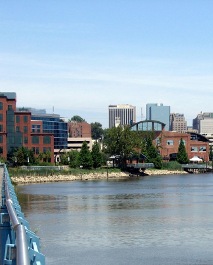Located between Baltimore and Philadelphia, the Wilmington metro had the highest share of total sales made to first-time buyers with FHA loans in the U.S. last year, 31 percent, more than double the 15.3 percent rate at the national level. FHA loans overall accounted for nearly 40 percent of sales in the Wilmington area, compared with a fifth of sales nationwide.
“I think with a combination of lower prices and great interest rates plus a good economic base we have a lot of first-time buyers,” said Dave Iliff, an agent at Patterson Schwartz Real Estate in Hockessin, Del.
“They are using FHA as conventional is still requiring at least 10 percent down payment, for the most part, and FHA is much more buyer friendly at (a) 96.5 percent (loan-to-value ratio).”
The Wilmington area’s unemployment rate was 8.4 percent in March, on par with national rate, and the area has the second-highest job growth expectations for the year between fourth-quarter 2011 and fourth-quarter 2012: 2.6 percent, compared with 1.7 percent nationally, according to Moody’s Analytics.
Though the Wilmington metro had the highest median sales price ($170,000) among the 10 markets in the first quarter, that price wasn’t much higher than the national median, $162,000. In addition, the metro’s median price has seen the sharpest decline (-10.1 percent) among the 10 markets between first-quarter 2011 and first-quarter 2012.
That decrease has helped pushed the area’s affordability up by 6 percent in the last year. Just over 90 percent of the area’s homes were affordable to families earning the area’s median income, $81,810, in the first quarter, according to the National Association of Home Builders/Wells Fargo Housing Opportunity Index.
According to Iliff, his first-time buyers tend to be couples or sometimes young families who typically purchase homes in the mid-to-high $100,000 range.
Two of these first-timers, Molly Dunson, 30, and Dave Shaw, 25, decided to buy a home in the Wilmington area after they got engaged. Dunson, who works in child welfare and is going to law school, had previously been living at home with her parents, while Shaw, who works in information technology, had been renting with a friend. Both grew up in the Wilmington area.
“We were looking for a single-family home in a nice neighborhood, with a couple of bedrooms and bathrooms where we could raise a few children,” Shaw said.
“We also didn’t want to have to do a lot of repairs. We were basically looking for a house we could stay in for a while, rather than a ‘starter’ home that we would move out of after a couple of years.”
While the homebuying process itself was “fairly straightforward,” many of the financial aspects of the purchase were “confusing or unexpected,” Dunson said.
“For instance, we didn’t know we’d need an earnest money deposit at the time we made our bid for the house. We were also confused about how that would come into play later, and it took us a while to figure out how much cash we would actually need for closing and what it was all for,” she said.
“I’m not really sure what might have helped us understand the process better. I guess maybe just a clear, detailed explanation of everything. I think the people who do it every day understand everything so well that they just give a quick, cursory explanation and think everyone is following what they’re saying,” she added.
First-time buyers in general aren’t as familiar with the homebuying process as repeat buyers and therefore “require some level of ‘hand holding,’ which is understandable,” Iliff said.
Ultimately, the couple found their home in the same neighborhood where Shaw’s grandparents live and closed the deal on March 30, for a sale price of $183,000.
The couple’s mortgage broker, Kim Sinko-Borges of Fairway Independent Mortgage, strongly suggested they use an FHA loan.
“A smaller down payment is required, which helps people like us who don’t have a huge amount of savings be able to purchase a house,” Shaw said.
Sinko-Borges said between 70 and 75 percent of her buyers use FHA financing — a share she anticipates she will continue to see “for the time being.”
“However, since the FHA (mortgage insurance premium) has increased so much lately, I feel more buyers will find ways to go with conventional financing if possible,” she said.

